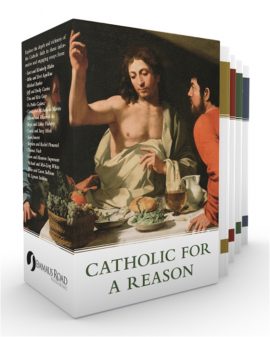By Curtis Mitch
Curtis Mitch is a writer, editor, and research fellow at the St. Paul Center. He has been a contributor to the popular apologetics series Catholic for a Reason (Emmaus Road Publishing); he has co-authored a commentary on the Gospel of Matthew with Edward Sri in the Catholic Commentary on Sacred Scripture series (Baker Academic); and he is the principal annotator and associate editor of the Ignatius Catholic Study Bible (Ignatius Press). He has also been a guest lecturer in theology at Franciscan University and an online instructor in theology for Catholic Distance University.

The first two chapters of Luke’s Gospel are widely cherished among Bible readers. They narrate the stories of John the Baptist’s conception and birth, the Annunciation to Mary and, of course, the Nativity and early childhood of Jesus. Situated in the midst of these profound events, however, is the humble occasion of Mary’s Visitation to Elizabeth (Luke 1:39–56). On the surface, the episode appears dwarfed and overshadowed by the towering mysteries which surround it; nevertheless, it too is a mystery of the Rosary and has a spiritual significance all its own—a significance in part derived from its connections with the Old Testament.
The storyline is a simple and familiar one: Mary heard from the angel Gabriel that her kinswoman Elizabeth—despite old age and a long history of barrenness—had conceived a child and was now six months pregnant. Overjoyed at the news, Mary set out “with haste” (Luke 1:39) to visit her cousin by taking a long trek from Nazareth to the hill country of Judah. Nothing extraordinary seemed to characterize these events until the two women finally met. All of a sudden, the Holy Spirit descended mightily on Elizabeth, the infant John jostled with joy in her womb, and she burst out in one of the most exuberant cries in Scripture: “Blessed are you among women, and blessed is the fruit of your womb!” (Luke 1:42). Were it not for the nudging impulse of the Spirit, we might have thought Mary’s cousin was overstating things a bit. How could Elizabeth have already known that Mary was chosen to be the mother of the Messiah? How could she (and John!) have a clear picture of the mystery within her before Christ was revealed to the world? It had to be the Holy Spirit who illumined her mind and moved her soul in this way; only divine light could reveal that this maiden and her infant were the most blessed mother and child in history.
But what did the words “Blessed are you among women” really mean? For the Catholic reader, this expression immediately recalls the beloved prayer, the “Hail Mary.” For Elizabeth and Mary, however, these words were strikingly similar to certain appellations in the Old Testament. The first time a statement like this found expression in the Bible was centuries earlier in the Book of Judges. The story is told of a heroine named Jael who stands out as one of the most valiant women in Old Testament history (Judges 4–5). She lived at a time when the people of Israel were like wandering sheep, with shepherds (i.e., judges) rising up only sporadically to give them spiritual guidance. Plagued by unstable leadership and deficient faith, God’s people were caught in a vicious cycle of sin and repentance that repeatedly called down God’s judgment upon them. In Jael’s day, the Canaanites were God’s chosen form of discipline for His wayward people. They pressed heavily upon Israel and treated them cruelly for many years; their military commander, Sisera, was particularly vicious and feared. When at last the Lord came to Israel’s assistance, He orchestrated a great battle through the prophetess Deborah and gave Israel a smashing victory over their oppressors. Every Canaanite warrior fell on the battlefield that fateful day except one—Sisera.
The Canaanite commander fled the scene in an attempt to save his life. He eventually came to lodge in the tent of Jael, thinking it a safe haven for military strategists on Israel’s “Most Wanted” list. He was sadly mistaken. Jael turned the tables on the mighty Sisera without his even realizing it: She crept stealthily to his bedside, drove a tent peg through his skull, and fashioned his head rather crudely to the floor of her tent! (Judges 4:21). Though a humble woman without any known expertise in the art of war, she single-handedly brought low the chief enemy of God’s people. For this reason Deborah hailed her with the exalted words: “Most blessed of women be Jael . . . of tent-dwelling women most blessed” (Judges 5:24). This is one biblical echo that whispers—if not shouts—behind the words of Elizabeth in Luke 1:42.
You Might Also Like
 The Catholic for a Reason series presents the biblical foundation of Church teaching through the wisdom and experience of today’s best apologists and scholars. Essential matters of faith—God’s plan of salvation, the Church, the Blessed Virgin Mary, the Mass, the Sacrament of Matrimony, and Catholic identity—are examined through the lens of Scripture to provide fresh insight and understanding for today’s Catholics.
The Catholic for a Reason series presents the biblical foundation of Church teaching through the wisdom and experience of today’s best apologists and scholars. Essential matters of faith—God’s plan of salvation, the Church, the Blessed Virgin Mary, the Mass, the Sacrament of Matrimony, and Catholic identity—are examined through the lens of Scripture to provide fresh insight and understanding for today’s Catholics.